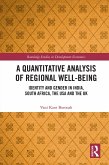Business and Development Studies (eBook, PDF)
Issues and Perspectives
Redaktion: Lund-Thomsen, Peter; Lindgreen, Adam; Wendelboe Hansen, Michael
42,95 €
42,95 €
inkl. MwSt.
Sofort per Download lieferbar

21 °P sammeln
42,95 €
Als Download kaufen

42,95 €
inkl. MwSt.
Sofort per Download lieferbar

21 °P sammeln
Jetzt verschenken
Alle Infos zum eBook verschenken
42,95 €
inkl. MwSt.
Sofort per Download lieferbar
Alle Infos zum eBook verschenken

21 °P sammeln
Business and Development Studies (eBook, PDF)
Issues and Perspectives
Redaktion: Lund-Thomsen, Peter; Lindgreen, Adam; Wendelboe Hansen, Michael
- Format: PDF
- Merkliste
- Auf die Merkliste
- Bewerten Bewerten
- Teilen
- Produkt teilen
- Produkterinnerung
- Produkterinnerung

Bitte loggen Sie sich zunächst in Ihr Kundenkonto ein oder registrieren Sie sich bei
bücher.de, um das eBook-Abo tolino select nutzen zu können.
Hier können Sie sich einloggen
Hier können Sie sich einloggen
Sie sind bereits eingeloggt. Klicken Sie auf 2. tolino select Abo, um fortzufahren.

Bitte loggen Sie sich zunächst in Ihr Kundenkonto ein oder registrieren Sie sich bei bücher.de, um das eBook-Abo tolino select nutzen zu können.
Business and Development Studies: Issues and Perspectives provides a comprehensive collection of cutting edge theoretical and empirical contributions to the emerging field of business and development studies.
- Geräte: PC
- ohne Kopierschutz
- eBook Hilfe
- Größe: 4.13MB
Andere Kunden interessierten sich auch für
![Socialism and Underdevelopment (eBook, PDF) Socialism and Underdevelopment (eBook, PDF)]() Ken PostSocialism and Underdevelopment (eBook, PDF)46,95 €
Ken PostSocialism and Underdevelopment (eBook, PDF)46,95 €![The Origins of Economic Inequality Between Nations (eBook, PDF) The Origins of Economic Inequality Between Nations (eBook, PDF)]() Carlos Ramirez-FariaThe Origins of Economic Inequality Between Nations (eBook, PDF)52,95 €
Carlos Ramirez-FariaThe Origins of Economic Inequality Between Nations (eBook, PDF)52,95 €![Overseas Research (eBook, PDF) Overseas Research (eBook, PDF)]() Christopher B. BarrettOverseas Research (eBook, PDF)42,95 €
Christopher B. BarrettOverseas Research (eBook, PDF)42,95 €![The Paradoxes of Aid Work (eBook, PDF) The Paradoxes of Aid Work (eBook, PDF)]() Silke RothThe Paradoxes of Aid Work (eBook, PDF)46,95 €
Silke RothThe Paradoxes of Aid Work (eBook, PDF)46,95 €![Evaluation Methodologies for Aid in Conflict (eBook, PDF) Evaluation Methodologies for Aid in Conflict (eBook, PDF)]() Evaluation Methodologies for Aid in Conflict (eBook, PDF)57,95 €
Evaluation Methodologies for Aid in Conflict (eBook, PDF)57,95 €![A Quantitative Analysis of Regional Well-Being (eBook, PDF) A Quantitative Analysis of Regional Well-Being (eBook, PDF)]() Vani Kant BorooahA Quantitative Analysis of Regional Well-Being (eBook, PDF)42,95 €
Vani Kant BorooahA Quantitative Analysis of Regional Well-Being (eBook, PDF)42,95 €![Popular Representations of Development (eBook, PDF) Popular Representations of Development (eBook, PDF)]() Popular Representations of Development (eBook, PDF)50,95 €
Popular Representations of Development (eBook, PDF)50,95 €-
-
-
Business and Development Studies: Issues and Perspectives provides a comprehensive collection of cutting edge theoretical and empirical contributions to the emerging field of business and development studies.
Dieser Download kann aus rechtlichen Gründen nur mit Rechnungsadresse in A, B, BG, CY, CZ, D, DK, EW, E, FIN, F, GR, HR, H, IRL, I, LT, L, LR, M, NL, PL, P, R, S, SLO, SK ausgeliefert werden.
Produktdetails
- Produktdetails
- Verlag: Taylor & Francis eBooks
- Seitenzahl: 508
- Erscheinungstermin: 16. Oktober 2019
- Englisch
- ISBN-13: 9781351670876
- Artikelnr.: 57923120
- Verlag: Taylor & Francis eBooks
- Seitenzahl: 508
- Erscheinungstermin: 16. Oktober 2019
- Englisch
- ISBN-13: 9781351670876
- Artikelnr.: 57923120
- Herstellerkennzeichnung Die Herstellerinformationen sind derzeit nicht verfügbar.
Peter Lund-Thomsen is Professor of Corporate Social Responsibility and Sustainability in the Global South at the Copenhagen Business School, Denmark. He is Associate Editor of Competition and Change and has been Associate Editor of Business Ethics: A European Review. Michael Wendelboe Hansen is Associate Professor at the Copenhagen Business School in Denmark. He has done extensive empirical research on Danish multinational companies and emerging markets, on outward foreign direct investment from developing countries (in particular from India), and on private-sector development. Adam Lindgreen is Professor of Marketing at Copenhagen Business School where he heads the Department of Marketing. He also is Extraordinary Professor with the University of Pretoria's Gordon Institute of Business Science.
Part 1 Introduction 1.1 Business and development studies-issues and
perspectives Part 2 Business, Governance, and Development 2.1 Governance,
business, and development 2.2 State-business relations and development:
toward a more complete research agenda 2.3 International business and
economic development2.4 The financialization and responsibilization of
development aid Part 3 Global Value Chains, Business, and Development 3.1
Global value chains, development, and emerging economies 3.2 Corporate
social responsibility in global value chains: Where are we now? Where are
we going? 3.3 Critical reflections on the effectiveness of responsible
business initiatives and systemic constraints for achieving a safe and just
operating space for humanity 3.4 Multi-stakeholder initiatives in global
value chains: Opportunities and challenges for women workers Part 4
International Business, Corporate Social Responsibility, and Development
4.1 CSR in developing countries: Competing perspectives on businesses,
their roles, and responsibilities 4.2 The state of international business,
corporate social responsibility, and development: Key insights and an
application to practice 4.3 Corporate social responsibility and
development: The case of international business firms in emerging economies
4.4 Analysis of the MNEs' social practices in Latin America: Implications
for development studies research 4.5 Business, development, and human
rights 4.6 Impacts of neoliberal wind energy investments on environmental
justice and human rights in Mexico Part 5 Local Firms, Organizations, and
Development 5.1 When do businesses innovate in a developing country? An
empirical investigation of determinants of innovative performance of
Ugandan micro and small businesses 5.2 Microfinance programs and women's
empowerment: New evidence from rural middle hills of Nepal 5.3 Social
entrepreneurship as vehicle for inclusive development: The case of Siya
Sebenza in South Africa 5.4. Micro and small business clusters and local
development policies: Insights from India-Italy cooperation project
perspectives Part 2 Business, Governance, and Development 2.1 Governance,
business, and development 2.2 State-business relations and development:
toward a more complete research agenda 2.3 International business and
economic development2.4 The financialization and responsibilization of
development aid Part 3 Global Value Chains, Business, and Development 3.1
Global value chains, development, and emerging economies 3.2 Corporate
social responsibility in global value chains: Where are we now? Where are
we going? 3.3 Critical reflections on the effectiveness of responsible
business initiatives and systemic constraints for achieving a safe and just
operating space for humanity 3.4 Multi-stakeholder initiatives in global
value chains: Opportunities and challenges for women workers Part 4
International Business, Corporate Social Responsibility, and Development
4.1 CSR in developing countries: Competing perspectives on businesses,
their roles, and responsibilities 4.2 The state of international business,
corporate social responsibility, and development: Key insights and an
application to practice 4.3 Corporate social responsibility and
development: The case of international business firms in emerging economies
4.4 Analysis of the MNEs' social practices in Latin America: Implications
for development studies research 4.5 Business, development, and human
rights 4.6 Impacts of neoliberal wind energy investments on environmental
justice and human rights in Mexico Part 5 Local Firms, Organizations, and
Development 5.1 When do businesses innovate in a developing country? An
empirical investigation of determinants of innovative performance of
Ugandan micro and small businesses 5.2 Microfinance programs and women's
empowerment: New evidence from rural middle hills of Nepal 5.3 Social
entrepreneurship as vehicle for inclusive development: The case of Siya
Sebenza in South Africa 5.4. Micro and small business clusters and local
development policies: Insights from India-Italy cooperation project
Part 1 Introduction 1.1 Business and development studies-issues and
perspectives Part 2 Business, Governance, and Development 2.1 Governance,
business, and development 2.2 State-business relations and development:
toward a more complete research agenda 2.3 International business and
economic development2.4 The financialization and responsibilization of
development aid Part 3 Global Value Chains, Business, and Development 3.1
Global value chains, development, and emerging economies 3.2 Corporate
social responsibility in global value chains: Where are we now? Where are
we going? 3.3 Critical reflections on the effectiveness of responsible
business initiatives and systemic constraints for achieving a safe and just
operating space for humanity 3.4 Multi-stakeholder initiatives in global
value chains: Opportunities and challenges for women workers Part 4
International Business, Corporate Social Responsibility, and Development
4.1 CSR in developing countries: Competing perspectives on businesses,
their roles, and responsibilities 4.2 The state of international business,
corporate social responsibility, and development: Key insights and an
application to practice 4.3 Corporate social responsibility and
development: The case of international business firms in emerging economies
4.4 Analysis of the MNEs' social practices in Latin America: Implications
for development studies research 4.5 Business, development, and human
rights 4.6 Impacts of neoliberal wind energy investments on environmental
justice and human rights in Mexico Part 5 Local Firms, Organizations, and
Development 5.1 When do businesses innovate in a developing country? An
empirical investigation of determinants of innovative performance of
Ugandan micro and small businesses 5.2 Microfinance programs and women's
empowerment: New evidence from rural middle hills of Nepal 5.3 Social
entrepreneurship as vehicle for inclusive development: The case of Siya
Sebenza in South Africa 5.4. Micro and small business clusters and local
development policies: Insights from India-Italy cooperation project
perspectives Part 2 Business, Governance, and Development 2.1 Governance,
business, and development 2.2 State-business relations and development:
toward a more complete research agenda 2.3 International business and
economic development2.4 The financialization and responsibilization of
development aid Part 3 Global Value Chains, Business, and Development 3.1
Global value chains, development, and emerging economies 3.2 Corporate
social responsibility in global value chains: Where are we now? Where are
we going? 3.3 Critical reflections on the effectiveness of responsible
business initiatives and systemic constraints for achieving a safe and just
operating space for humanity 3.4 Multi-stakeholder initiatives in global
value chains: Opportunities and challenges for women workers Part 4
International Business, Corporate Social Responsibility, and Development
4.1 CSR in developing countries: Competing perspectives on businesses,
their roles, and responsibilities 4.2 The state of international business,
corporate social responsibility, and development: Key insights and an
application to practice 4.3 Corporate social responsibility and
development: The case of international business firms in emerging economies
4.4 Analysis of the MNEs' social practices in Latin America: Implications
for development studies research 4.5 Business, development, and human
rights 4.6 Impacts of neoliberal wind energy investments on environmental
justice and human rights in Mexico Part 5 Local Firms, Organizations, and
Development 5.1 When do businesses innovate in a developing country? An
empirical investigation of determinants of innovative performance of
Ugandan micro and small businesses 5.2 Microfinance programs and women's
empowerment: New evidence from rural middle hills of Nepal 5.3 Social
entrepreneurship as vehicle for inclusive development: The case of Siya
Sebenza in South Africa 5.4. Micro and small business clusters and local
development policies: Insights from India-Italy cooperation project







